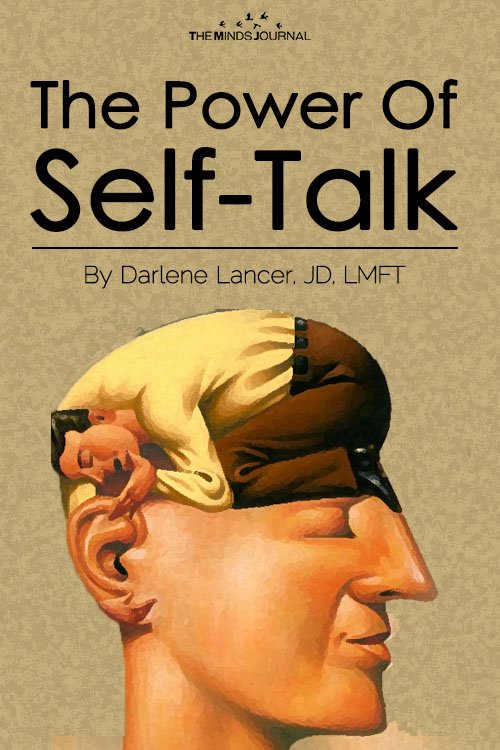Are you aware that you talk to yourself all the time? We all do. Our self-talk makes a huge difference in our lives for better or for worse. The question to ask yourself is whether your inner voice is your friend or foe.
Our unconscious is impacted by the words we say in the same way that it is when other people talk to us. Thus, how we speak to ourselves can be a powerful tool. The power of self-talk is the most underutilized available resource to master our minds and improve our lives. Our thoughts influence our feelings, choices, and actions. Positive thinkers are more optimistic, confident, and successful. Their effect is contagious and uplifts friends, coworkers, and loved ones.
Our Role Models
Starting in childhood, our self-talk develops over time. If you’ve ever watched young children play, you’ve overheard them talk to themselves, their dolls, action figures, and their friends in words and tone similar to what they’ve heard from influential adults, especially their parents. How parents talk to them and also how they talk to themselves and each other provide role models. Gradually, children internalize that voice.
This is a positive development that helps children master tasks, comfort themselves, and learn to interact with peers. Patient teachers and parents teach children patience with themselves, but undermining, critical, or angry role models teach children to talk to themselves with doubt, frustration, and scorn.
Codependents grow up in dysfunctional families where parents generally provide ineffective role models, ranging from neglect, emotional reactivity, over-control, disapproval, or blatant verbal abuse. Even when well-meaning parents tell their children they shouldn’t feel ashamed or sad, parents are inadvertently shaming their children’s authentic feelings. This can lead to internalized shame, which can have a major deleterious effect on adult functioning.
The “Tyrannical Trio:” The Critic, Perfectionist, and Pusher
In Codependency for Dummies, I describe the “Tyrannical Trio” comprised of three inner voices: The Critic, Perfectionist, and Pusher. They work in tandem reinforcing one another and can make life hell. The Perfectionist sets up idealistic standards, the Pusher pushes us to achieve them, and the Critic faults us for never succeeding.
The Perfectionist expects us to be superhuman, ensuring that we’ll fail to meet its unattainable standards; the Pusher is a relentless taskmaster, depriving us of enjoyment of life and pleasure; and the Critic tells us we’re never good enough.
The Pusher and Perfectionist can help us achieve our goals if we have positive perfectionism. But of all three, the Critic does the most damage and can significantly undermine our self-esteem. Moreover, trying something new and making decisions can be near impossible because of anxiety that things won’t turn out well. In actuality, we’re afraid of our own Inner Critic. The Critic is also an essential difference between positive and negative perfectionism. The trio creates anxiety, depression, and inertia.
Related: How Self-Compassion Can Fight Perfectionism
Most people aren’t even aware of the extent to which they accuse, blame, and deny themselves. Many people live with the “tyranny of the should’s.” They order themselves around and second-guess themselves after the fact. There are those individuals who believe that they must push and punish themselves to improve or achieve anything; otherwise, they’re afraid that they’ll end up as lumps on the couch. Never mind that they’re pushing and reproaching themselves into depression by creating greater unhappiness and dissatisfaction in their lives and those of their families.
The power of self-talk can swamp us with anxiety and rumination and overpower us with shame attacks and painful emotions. It can offer comfort and encouragement or make us feel anxious and inadequate. It can provide self-discipline and organization or make us feel overwhelmed and defeated. It can ruin our lives, job opportunities, and relationships, or it can be harnessed to raise our self-esteem, achieve our goals, and uplift our outlook and enjoyment of life.
Changing Our Self-Talk
Although we’ve grown accustomed to these inner voices, they can be changed. It first requires our becoming more aware of them and developing mindfulness about our self-talk. There are a number of steps to reform these voices that include gaining an understanding of their motives and standards and learning to modify and counteract them. 10 Steps to Self-Esteem: The Ultimate Guide to Stop Self-Criticism is designed to succinctly lay out specific steps and exercises to do just that. There are several things you can begin doing immediately.
Mindfulness
Until you’re acutely aware of your inner voices, you can’t change them. Write down your negative self-talk on a daily basis. Writing down your negative self-talk, including all the “should” and “shouldn’t’s,” will make them more conscious and provide you with choices.
Self-distancing
Practice positive self-talk by addressing yourself in the third-person. This has the effect of “self-distancing” by shifting the focus away from the self.
Research has shown that by calling yourself by name, you begin to talk to yourself as you would a third person. It helps you regulate your emotions because you’re less emotionally involved and acquire a larger perspective. In effect, your emotional brain is less triggered, and you become wiser. This small change has a profound positive impact on reducing shame, anxiety, and depression. It provides you with increased clarity and better judgment in dealing with work and relationships.
Related: The 5 Types of Self-Talk Your Brain Likes Best
Affirmations
Build positive thinking habits. Spend time each day and throughout the day repeating positive self-talk. If you say a prayer each morning, but negate yourself the rest of the day, which words do you think will have more impact?
Try to make your positive self-talk outweigh any negative self-talk. This way you can develop an improved outlook and attitudes, which can lead to better health and decisions and greater success in your relationships and work.
©Darlene Lancer 2017
Written by Darlene Lancer JD, MFT
Originally appeared on WhatIsCodependency.com










Leave a Reply
You must be logged in to post a comment.